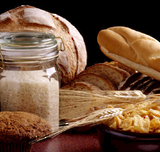Parents versus picky eaters
|
Parents are often really frustrated by picky eating as it seems to defy logic. However, as parents we need to remember that we approach food in one way, whilst our picky eater approaches it in another. There is often a huge disconnect between how we look at things and how our children look at things, which can generate a lot of confusion and frustration.
|
You might also be interested in ...
Spotting food intolerances in young kids
Would you know if your child had a food intolerance? Food intolerances and food allergies are fairly common these days, so it's important to have some understanding of certain food groups and how they could affect your child. We look at the most common food intolerances, how to identify food intolerances and the difference between food intolerances and food allergies.
Kids birthday cake tips
A birthday party is just not a birthday party without a cake, candles and the singing of Happy Birthday. However birthday cakes can sometimes cause parents a lot stress and unnecessary worry. Check out these ideas to help ease the pressure when it comes to kids birthday cakes.







However, as parents we need to remember that we approach food in one way, whilst our fussy eater approaches it in another.
There is often a huge disconnect between how we look at things and how our children look at things, which can generate a lot of confusion and frustration.
The disconnect between parents & fussy eaters
Here’s a common example of how we as parents approach food compared to our fussy little eaters:
You serve your child a strawberry frozen yoghurt. They love strawberry ice cream, so you're sure they will also love this.
Although you know from experience that because it's a new food for them, they are very likely to say 'no' they don’t want to try it' or that they 'don’t like it'.
As a parent you follow a logical thought process, and might think:
- it looks pretty much exactly the same
- they love frozen confectionery products
- it's the right flavour
- it's the right colour
- the texture seems the same
- I know they'll like this, if only they try it
Your child on the other hand might think:
- Ahhhhh, this is not my usual ice cream!
Young children have no logical thought process, just an automatic 'no I don’t like it' or 'no I don’t want to try it'. They see new foods as scary, different and safer it they avoid it.
As parents, we base our approach to food from a logical, analytical, thinking brain angle.
As a child that is fearful of new foods, your child is not thinking. They are reacting to a situation that makes them feel uncomfortable and logic does not therefore enter into it. It is far better for them to just say no and refuse the new food.
The more often your child says no on auto-pilot, the more this becomes the habitual response.
For a parent, if we understand this, it can help relieve some of the frustration.
Your fussy eater is not being wilfully stubborn, they are just seeing something new and that new is not comfortable.
Source: This article was kindly written for us by The Confident Eater - giving you the tools, the strategies and the confidence to get your picky eater eating.